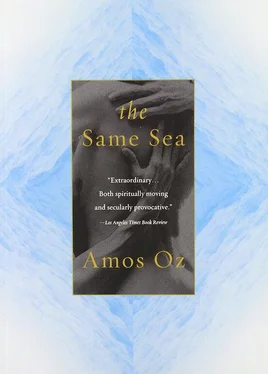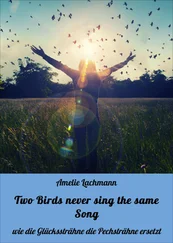A car park. Silence. Dogs barking in the distance at a moon
that does not answer. Get out. Cut your roots and go.
Evening and she has not come. Next door a child is crying, tiredly,
monotonously, knowing that nothing will help. In the one-room flat
I have rented for her in Mazeh Street there is no phone yet And even
if there were I wouldn't. This evening she won't come. On my own eating
black bread, cheese and olives. It's a long evening. Everyone is on his own
this evening and I too am on my own. I am wondering whether the money I
sent has reached you. Anxious about avalanches, landslides on those slopes.
Or awake, reading by candlelight in the cold in an abandoned temple. The
evening is still. The child who was crying before is quiet now. Here at my
kitchen window the sea is talking about autumn already. Another glass of tea
and I'll sit down to check a balance sheet that doesn't balance. Many send in
their accounts. Only the lonely know how to be accurate.
Yes the night is really cold and the snow reminds him of his father.
It creeps like a tiny furry creature
slinking across the valley.
Quiet and even, it gropes at the roof and the walls.
In the dark the sleepwrapped snow on tiptoe,
silent and anxious, spreads a blanket over him.
And the same evening Dita too
In a foam-filled bath
she pities their loneliness:
one wanted me to mother him
the other looks to me as a daughter.
To be a woman to both of them
is something I can only do in the bath.
Evening. Rain falls on the empty desert hills. Chalk and flint and the smell
of dust being wetted after an arid summer. A wish stirs: to be
what I would have been had I not known what is known. To be before
knowledge. Like the hills. Like a rock on the surface of the moon.
Simply there, motionless, and trusting
in the length of its shelf life.
Night. In the garden ploughs a breeze. A cat,
I think a cat, pads among bushes, a shadow
flitting among the shadows. It sniffs or guesses
something hidden from me. What is not mine to sense
is taking shape there now without me. Cypresses
tremble slightly, black, in a motion of mourning,
I think beside the wall. Something there is touching
some other thing. Something is expiring. Ostensibly
all this is taking shape right before my eyes
as I watch the garden from this window. So I think.
In fact all this has always happened and always will
but only ever behind my back.
Waking tired at twenty to five. Lights. A pee. A wash. Then standing
with a coffee at the window. Chilly mist still in the bushes. The garden
light continues signalling to itself. The lawn is still damp.
Empty. Chairs, with legs in the air, upside down on the garden table.
There is a milky light
toward dawn, lest we forget that we are in
the Milky Way, a remote galaxy flickering until it fades out.
Until it fades out five-o'clock-in-the-morning things are happening. A
startled bird calls out in surprise, as though this were the very first morning.
Or the very last. Between two branches of a ficus an early spider is at work.
From the humors of its body it spins a tight net in which it hunts
twenty or thirty dewdrops that do not sit idle either but catch splinters
of light and multiply each one sevenfold. Every captive splinter, for its part,
translates itself to lightning. Until the paper arrives I'll sit down and write too.
Rico thinks about the mysterious snowman
Man that is born of woman bears his parents on his shoulders. No, not on
his shoulders. Within him. All his life he is bound to bear them,
together with all their host, their parents, their parents' parents,
a Russian doll heavy with child back to the first generation:
wherever he walks he bears his forebears, when he lies down he bears
his forebears and when he rises up he bears them, or if he wanders far or
stays in his place. Night after night he shares his cot with his father
and his couch with his mother until his day comes.
But that snowman is not born of woman. Weightless and naked
it roams alone on the barren mountains. Neither born nor begetting
neither loving nor thirsty for love. It has never mourned
nor lost a living soul. Ageless it floats over the snows,
fatherless, motherless, homeless, timeless and deathless. Alone.
He rolls down the woman Maria's stockings, one by one, his eyes
digging into her flesh. These are the eyes of the flesh. The eyes
of his spirit are closed. Were they not closed he would see Maria not
in her ripe sensuality but as she will look in old age, shrivelled like a
dried fig. If he opened the eyes of his spirit the desires of the flesh
would subside. His lust would turn to dust.
Or it could be put like this: climbing a tortuous track in the mountains,
between two chasms. His glance is alert and sharp but the eyes of his spirit
are shut If he opens them just for an instant, he will feel dizzy and fall.
All this is ancient knowledge: the eyes of the flesh covet, the eye of the spirit
goes dark, he who is here is you without you, he who is not
here is not here, but if so why love a woman? Why walk across chasms?
Your son longs for the extinction of sleep. And at once
he sleeps. The wind outside the hut
howls. A fox slinks by in the wood
and there is a night bird hidden in the leaves
seeing what is coming but choosing to pass over
in silence. In seventeen hundred and six
a wandering merchant from Russia who was on his way to China
breathed his last in this hut. He died
alone in his sleep and was buried in the wood
where he sank into the depth of oblivion.
A wandering merchant from Russia who was on his way to China
to take furs and precious stones from Nizhni to Nanking, and from Nanking
brought back jewelery and silk. He was fond of drinking and eating at
wayside inns, strange travellers' tales at night in front of a blazing fire,
and servant girls' favors on a straw palliasse by the light of a clay lamp.
He took pleasure in shrewd selling and in haggling for a bargain, fine
patient dealing, resembling courtship, or loveplay in which
he who lasts longest wins, and the swift have no advantage: he who desires
must feign indifference and cloak his eagerness with uncertainty. In the spring
he set his steps eastward and returned homeward in the fall, crossing
rivers and forests, steppes and mountain passes, and every year
the hoard of coins buried in his courtyard grew and grew.
One evening, in this hut, he ate his fill till midnight, paid
a girl to wait on his couch and warm his bedding,
and, when she had left, he settled comfortably on his back
to count and calculate how much he had gained this year,
how much the next would bring, and how much more
he would accumulate in the course of the decade. Until his eyelids
dropped and he slept and at daybreak the servant girl
shook his shoulders to no avail, so she raised her voice and cried,
Читать дальше












